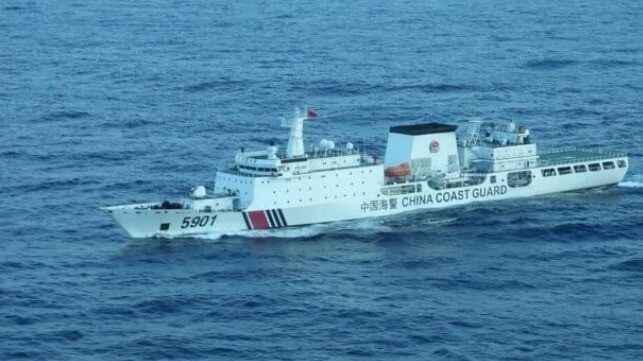China's Opening Salvo Against Taiwan Will Likely Be a Partial Blockade
A law enforcement "quarantine" of specific, strategic imports could be an attractive method for Beijing

[By Jane Rickards]
The West had better think carefully about how it would handle China imposing a nominally civil quarantine on Taiwan, because that’s the tactic that increasingly looks like an opening move for Beijing in taking control of the island.
A quarantine, imposing limited controls on access to the island, offered strong advantages for China even before Taiwan said in October that a blockade, surrounding it with forces to cut off all access, would be an act of war. Taiwan’s statement means China is even more likely to choose quarantine as a first step.
This use of the word ‘quarantine’ was coined in an important Center for Strategic and International Studies report last year. The authors foresaw that the Chinese government might ban only certain types of goods from entering Taiwan, or it could forbid ships from using a certain port. The measures would be enforced by nominally non-military forces, such as the China Coastguard.
Conceivably, China could see whether it could get away once with a quarantine action, then, noting success in asserting its authority, do it again and gradually tighten restrictions until they turned into a blockade—salami slicing, as it does in so many areas of international affairs.
First among the inherent advantages of quarantine for Beijing is that, unlike more warlike action, it brings no commitment to go all the way, to conquer or be defeated. It would raise no great expectation among the highly nationalist Chinese people of imminent conquest of Taiwan. So if the measure met stiff resistance, the Chinese Communist Party could back away from it, declaring that some civil administrative objective had been achieved.
Yet forcing it to back down would be difficult for Taiwan and its friends, which is another advantage of the quarantine tactic. They would have to escalate with warships and possibly armed force to stop a China Coast Guard ship from intercepting a freighter, for example. This would put Taiwan and the West in the unfortunate position of looking like the initiators of military conflict. On the other hand, if Taiwan and the West did nothing, and intimidated shipping companies mostly went along with the quarantine, China’s narrative that it had control over Taiwan would be strengthened.
Taiwanese Minister of National Defence Wellington Koo said in October that Taiwan would consider a blockade an act of war and would respond on a war footing after massive Chinese military drills were held near the island.
A quarantine would probably cause little or no disruption to China’s own trade, whereas the risk of military confrontation in a blockade could frighten ship owners into avoiding the Taiwan Strait and Chinese ports near it. This would severely affect China’s economy: most shipments that pass through the Taiwan Strait are Chinese imports and exports.
A quarantine would probably involve no dramatic announcements from Beijing. Instead, China could claim it merely needed to expand customs procedures in the Taiwan Strait and surrounding waters where China believes it has jurisdiction. This might involve the Chinese coast guard carrying out inspections of ships and boarding non-Chinese vessels to inspect their paperwork. Vessels that refuse to comply could be forced to turn back or even be hit with water cannons. The coast guard could then restrict vital imports that enter Taiwan, such as energy products. This could cripple the Taiwanese economy and have the effect of shattering the Taiwanese people’s morale and willingness to resist Beijing.
Throughout 2024, China’s coast guard increased intrusive patrols in waters around Taiwan’s outlying Kinmen archipelago, which is close to China.
In a possible early sign of a quarantine tactic, China’s coast guard in February 2024 intercepted a Taiwanese sight-seeing ferry that was sailing around Kinmen’s main island during a period when cross-strait tensions were running high. Chinese coast guard officers boarded the Taiwanese boat and asked to inspect the documentation of the crew, before disembarking a while later. Then, in mid-May, the Chinese state media outlet China Daily said, ‘In the future, this ‘Kinmen model’ of law enforcement inspections can also be applied to Matsu and Penghu islands, and even the entire Taiwan Strait.’
Among the difficult options for Taiwanese and Western response might be beefing up of Taiwan’s own coast guard, which is vastly smaller than China’s, and training it to respond to such tactics.
The US could also impose financial sanctions on China if it imposed a quarantine and persuade other democracies to join in. In doing so, the West would be hitting back at China using tactics that, like China’s quarantine, fall short of war. This might also meet the incoming Trump administration’s goal of weakening China, which it views as an economic competitor.
Whatever the response will be, plans are needed. Quarantine is so attractive a measure for China that Taiwan and its friends must be prepared.
Jane Rickards, a journalist and frequent contributor to The Economist, has lived in Taiwan since 2004.
This article appears courtesy of The Strategist and may be found in its original form here.
The opinions expressed herein are the author's and not necessarily those of The Maritime Executive.
No comments:
Post a Comment